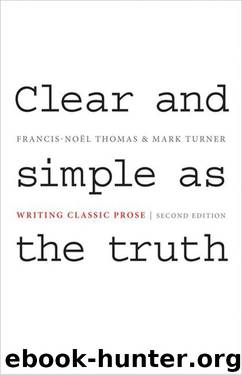Clear and Simple as the Truth: Writing Classic Prose (Second Edition) by Francis-Noël Thomas & Mark Turner

Author:Francis-Noël Thomas & Mark Turner [Thomas, Francis-Noël]
Language: eng
Format: epub, mobi
ISBN: 9780691147437
Publisher: Princeton University Press
Published: 2011-02-28T05:00:00+00:00
Il faut exprimer le vrai pour écrire naturellement, fortement, délicatement.
[It is necessary to express what is true in order to write naturally, powerfully, sensitively.]
—Jean de La Bruyère, Les Caractères
En vérité [le roi] est admirable et mériterait bien d’avoir d’autres historiens que deux poètes: vous savez aussi bien que moi ce qu’on dit en disant des poètes: il n’en aurait nul besoin. Il ne faudrait ni fable, ni fiction pour le mettre au-dessus des autres; il ne faudrait qu’un style droit, pur, et net. . . .
[The truth is that {the king} is admirable and would certainly merit having historians other than two poets. You know as well as I do what we mean in saying poets. He would have no need of them whatever; it would require no invention, no fiction to place him above the others; it would require only a pure style, clean and straightforward. . . .]
—Madame de Sévigné, letter to Bussy-Rabutin, 18 March
1678
These two passages, by two of the founders of French classic style, are complementary expressions of the prototypical classic stand on truth, which, in this tradition, is more compelling than any invention and is the natural object of unobstructed human intelligence. Invention requires artifice. Truth, which carries its own conviction, can dispense with sophisticated rhetorical or poetic artifice; it needs only to be presented clearly. Human intelligence recognizes truth naturally. Artifice misleads—that is its purpose. It does so by blunting the natural human sensitivity to truth, and in doing so weakens our natural capacity to perceive what is true.
Truth, then, is natural, powerful, and sensitive; the language that presents it best draws no attention to itself. When we talk about someone’s personal style, or the style of someone’s prose, we often refer to conspicuous attributes. When La Bruyère talks about writing “naturally,” he is thinking about a style that is anonymous in the way nature is anonymous. The format of a modern book is more natural in this sense than a codex, because, when open, a book is bilaterally symmetrical, as is the human body. A duodecimo book “fits” the hands, and while the modern book is a style of setting out a written text, it is so “natural, powerful, sensitive” that only a textual bibliographer, a binder, or an archivist is likely to be aware of it as a style of presenting a written text.
Classic style is like the form of a book; it can be noticed, but it is not conspicuous. It fits truth the way a book fits the hand. If we can imagine a machine or an extraterrestrial, with no knowledge of the human body, trying to design a format for presenting written prose to human readers, we have an image of La Bruyère’s concept of the writer trying to be natural, powerful, and sensitive in the absence of truth. The mechanical or extraterrestial design will be no more natural, powerful, or sensitive to a human reader than a duodecimo volume would be to an intelligent creature with the body of an oyster.
Download
Clear and Simple as the Truth: Writing Classic Prose (Second Edition) by Francis-Noël Thomas & Mark Turner.mobi
This site does not store any files on its server. We only index and link to content provided by other sites. Please contact the content providers to delete copyright contents if any and email us, we'll remove relevant links or contents immediately.
Asking the Right Questions: A Guide to Critical Thinking by M. Neil Browne & Stuart M. Keeley(5755)
Autoboyography by Christina Lauren(5226)
Eat That Frog! by Brian Tracy(4519)
Dialogue by Robert McKee(4386)
Sticky Fingers by Joe Hagan(4188)
Journeys Out of the Body by Robert Monroe(3615)
Annapurna by Maurice Herzog(3464)
Full Circle by Michael Palin(3443)
Schaum's Quick Guide to Writing Great Short Stories by Margaret Lucke(3369)
Elements of Style 2017 by Richard De A'Morelli(3339)
The Art of Dramatic Writing: Its Basis in the Creative Interpretation of Human Motives by Egri Lajos(3058)
Atlas Obscura by Joshua Foer(2952)
Why I Write by George Orwell(2944)
The Diviners by Libba Bray(2927)
The Fight by Norman Mailer(2926)
In Patagonia by Bruce Chatwin(2919)
The Mental Game of Writing: How to Overcome Obstacles, Stay Creative and Productive, and Free Your Mind for Success by James Scott Bell(2897)
Venice by Jan Morris(2568)
The Elements of Style by William Strunk and E. B. White(2470)
